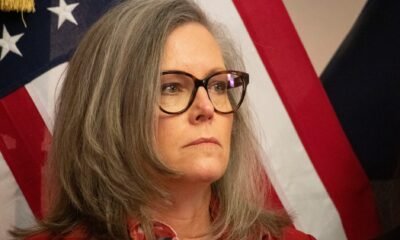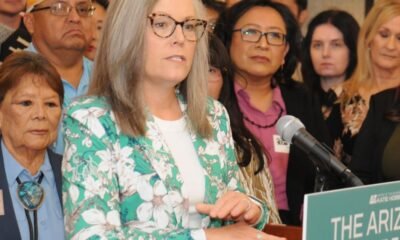china
Gov. Hobbs Unveils Tough New Ban on Foreign Governments Owning Land

In a significant move, Arizona Governor Katie Hobbs is introducing a new proposal aimed at tightening restrictions on land ownership for foreign adversaries. This comes in response to her recent veto that spurred criticism regarding national security implications.
Hobbs’s new legislation explicitly bans countries identified as “foreign adversary nations,” as well as their agents, from owning or purchasing real estate in Arizona. The sole exception applies only if a federal law deems a transaction free of national security risks.
Differing from a prior bill suggested by Senate Majority Leader Janae Shamp, which allowed for several exceptions based on property type and proximity to military installations, Hobbs’s plan takes a more stringent approach. It expands the list of restricted nations to include not only China but also Russia, Cuba, North Korea, Iran, and Venezuela.
Critics of Hobbs, including Shamp and Republican Senate President Warren Petersen, have accused her of neglecting the safety of Arizonans by vetoing the earlier version of the bill, which focused mainly on the Chinese Communist Party. Following that veto, Shamp labeled Hobbs an “obstructionist,” emphasizing the military significance of Luke Air Force Base in her district.
Despite the backlash, Hobbs asserts that her proposal, dubbed the Blocking Adversarial Nations Act, is a robust countermeasure against foreign ownership of land, dismissing the previous version as “weak.” She argues it effectively addresses the complexities of potential national security threats.
The debate intensifies against a backdrop of growing concern over foreign investments in Arizona farmland, specifically from China, which critics argue could facilitate espionage or military threats. Shamp contends that these holdings might enable adversaries to deploy threats directly against military bases, urging immediate action.
While Hobbs has not directly indicated that there is a current risk, her spokesperson emphasized that the legislation aims to protect Arizona’s security more effectively than earlier attempts. The governor’s approach outright bans land ownership for any foreign adversary and clarifies that the measure does not unfairly target individuals unless they qualify as “foreign adversary agents.”
Though the session is nearing its end, Hobbs remains hopeful about amending her proposal into existing legislation, seeking legislative support despite the challenges posed by Republican opposition. As the situation develops, the contentions surrounding land ownership, national security, and political maneuvering in Arizona’s statehouse continue to unfold.


















